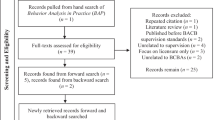Abstract
Competency-based supervision of trainees has recently come to the forefront of behavior analytic practice; however, there are minimal data to support the effectiveness of various supervision practices on trainee outcomes. Accordingly, this paper is intended to spark further discussion and research activity regarding the supervision of those seeking to become Board Certified Behavior Analysts (BCBA). We present a practice model and considerations for supervising applied behavior analytic trainees consistent with the Behavior Analyst Certification Board (BACB) Supervisor Training Curriculum Outline (Behavior Analyst Certification Board, 2012b), the Professional and Ethical Compliance Code for Behavior Analysts (Behavior Analyst Certification Board, 2014), and extant literature from behavior analysis and related fields. Inherent to the current model is a focus on bi-directional feedback and collaboration between the supervisor and trainee to frequently evaluate the acceptability of the procedures, process, outcomes, and effectiveness of supervision. We present a Supervision Monitoring and Evaluation Form consistent with the current model and discuss the assumed importance of objective and subjective self-assessment of supervisor competence to the ultimate advancement of the practice of applied behavior analysis.
Similar content being viewed by others
References
Abbass, A., Arthey, S., Elliott, J., Fedak, T., Nowoweiski, D., Markovski, J., et al. (2011). Web-conference supervision for advanced psychotherapy training: a practical guide. Psychotherapy, 48(2), 109–118.
Alvero, A. M., Bucklin, B. R., & Austin, J. (2001). An objective review of the effectiveness and essential characteristics of performance feedback in organizational settings. Journal of Organizational Behavior Management, 21(1), 3–29. doi:10.1300/J075v21n01_02.
American Psychological Association. (2015). Guidelines for clinical supervision in health service psychology. American Psychologist, 70(1), 33–46. doi:10.1037/a0038112.
Baer, D. M., Wolf, M. M., & Risley, T. R. (1968). Some current dimensions of applied behavior analysis. Journal of Applied Behavior Analysis, 1(1), 91–97. doi:10.1901/jaba.1968.1-91.
Balacazar, F. E., Hopkins, B. L., & Suarez, Y. (1985). A critical objective view of performance feedback. Journal of Organizational Behavior Management, 7(3–4), 65–89. doi:10.1300/J075v07n03_05.
Behavior Analyst Certification Board. (2011). Online newsletter, September issue. Littleton, CO: Behavior Analyst Certification Board.
Behavior Analyst Certification Board. (2012a). Coursework requirements for BACB credentials: fourth edition task list. Littleton, CO: Behavior Analyst Certification Board.
Behavior Analyst Certification Board. (2012b). Supervisor training curriculum outline. Littleton, CO: Behavior Analyst Certification Board.
Behavior Analyst Certification Board. (2014). Professional and ethical compliance code for behavior analysts. Littleton, CO: Behavior Analyst Certification Board.
Behavior Analyst Certification Board. (2015). Experience standards. Littleton, CO: Behavior Analyst Certification Board.
Bernard, J. M., & Goodyear, R. K. (2014). Fundamentals of clinical supervision (5th ed.). Boston, MA: Pearson.
Bordin, E. S. (1983). A working alliance based model of supervision. The Counseling Psychologist, 11(1), 35–42. doi:10.1177/0011000083111007.
Carr, E. G., Levin, L., McConnachie, G., Carlson, J. I., Kemp, D. C., & Smith, C. E. (1997). Communication-based intervention for problem behavior: a user’s guide for producing positive change. Baltimore, Maryland: Paul H. Brookes Publishing Co., Inc.
Cavalari, R. N. S., Gillis, J. M., Kruser, N., & Romanczyk, R. G. (2015). Digital communication and records in service provision and supervision: regulation and practice. Behavior Analysis in Practice, 8(2), 176–189. doi:10.1007/s40617-014-0030-3.
Cooper, J. O., Heron, T. E., & Heward, W. L. (2007). Applied behavior analysis. Upper Saddle River: Pearson Education.
Daniels, A. C., & Bailey, J. S. (2014). Performance management: changing behavior that drives organizational effectiveness (5th ed.). Atlanta: Aubrey Daniels International, Inc.
DiGennaro, F. D., Martens, B. K., & Kleinmann, A. E. (2007). A comparison of performance feedback procedures on teachers’ treatment implementation integrity and students’ inappropriate behavior in special education classrooms. Journal of Applied Behavior Analysis, 40(3), 447–461. doi:10.1901/jaba.2007.40-447.
Dunn, K. E., & Mulvenon, S. W. (2009). A critical review of research on formative assessment: the limited scientific evidence of the impact of formative assessment in education. Practical Assessment, Research & Evaluation, 14(7), 1–11.
Eikeseth, S., Hayward, D., Gale, C., Gitlesen, J., & Eldevek, S. (2009). Intensity of supervision and outcome for preschool aged children receiving early and intensive behavioral interventions: a preliminary study. Research in Autism Spectrum Disorders, 3(1), 67–73. doi:10.1016/j.rasd.2008.04.003.
Falender, C. A., Erickson Cornish, J. A., Goodyear, R., Hatcher, R., Kaslow, N. J., Leventhal, G., et al. (2004). Defining competencies in psychology supervision: a consensus statement. Journal of Clinical Psychology, 60(7), 771–785. doi:10.1002/jclp.20013.
Falender, C. A., & Shafranske, E. P. (2012). The importance of competency-based clinical supervision and training in the twenty-first century: why bother? Journal of Contemporary Psychotherapy, 42(3), 129–137. doi:10.1007/s10879-011-9198-9.
Florell, D. (2016). Web-based training and supervision. In J. K. Luiselli & A. J. Fischer (Eds.), Computer-assisted and web-based innovations in psychology, special education, and health. New York: Academic Press/Elsevier.
Frank, F. R., Snell, L. S., tenCate, O., Holmboe, E. S., Carraccio, C., Swing, S. R., et al. (2010). Competency-based medical education: theory to practice. Medical Teacher, 32(8), 638–645. doi:10.3109/0142159X.2010.501190.
Gibson, J. A., Grey, I. M., & Hastings, R. P. (2009). Supervisor support as a predictor of burnout and therapeutic self-efficacy in therapists working in ABA schools. Journal of Autism and Developmental Disorders, 39, 1024–1030. doi:10.1007/s10803-009-0709-4.
Gonsalvez, C., & Freestone, J. (2007). Field supervisors’ assessments of trainee performance: are they reliable and valid? Australian Psychologist, 42(1), 23–32. doi:10.1111/j.17429544.2011.00033.x.
Grady, B., Myers, K. M., Nelson, E., Belz, N., Bennett, L., Carnahan, L., et al. (2011). Evidence-based practice for telemental health. Telemedicine and e-Health, 17(2), 131–148.
Gresham, F. M., Gansle, K. A., & Noell, G. H. (1993). Treatment integrity in applied behavior analysis with children. Journal of Applied Behavior Analysis, 26(2), 257–263. doi:10.1901/jaba.1993.26-257.
Gunby, K. V., & Rapp, J. T. (2014). The use of behavioral skills training and in situ feedback to protect children with autism from abduction lures. Journal of Applied Behavior Analysis, 47(4), 856–860. doi:10.1002/jaba.173.
Himle, M. B., Miltenberger, R. G., Flessner, C., & Gatheridge, B. (2004). Teaching safety skills to children to prevent gun play. Journal of Applied Behavior Analysis, 37(1), 1–10. doi:10.1901/jaba.2004.37-1.
Himle, M. B., & Wright, K. A. (2014). Behavioral skills training to improve installation and use of child passenger safety restraints. Journal of Applied Behavior Analysis, 47(3), 549–559. doi:10.1002/jaba.143.
Hoffman, M. A., Hill, C. E., Holmes, S. E., & Freitas, G. F. (2005). Supervisor perspective on the process and outcome of giving easy, difficult, or no feedback to trainees. Journal of Counseling Psychology, 52(1), 3–13. doi:10.1037/0022-0167.52.1.3.
Iwata, B. A., Dorsey, M. F., Slifer, K. J., Bauman, K. E., & Richman, G. S. (1994). Toward a functional analysis of self-injury. Journal of Applied Behavior Analysis, 27(2), 197–209. doi:10.1901/jaba.1994.27-197.
Jones, R. T., Kazdin, A. E., & Haney, J. L. (1981). Social validation and training of emergency fire safety skills for potential injury prevention and life saving. Journal of Applied Behavior Analysis, 14(3), 249–260. doi:10.1901/jaba.1981.14-249.
Kraemer-Tebes, J., Matlin, S. L., Migdole, S. J., Farkas, M. S., Money, R. W., Shulman, L., et al. (2011). Providing competency training to clinical supervisors through an interactional supervision approach. Research on Social Work Practice, 21(2), 190–199. doi:10.1177/1049731510385827.
Ladany, N., Hill, C. E., Corbett, M. M., & Nutt, E. A. (1996). Nature, extent, and importance of what psychotherapy trainees do not disclose to their supervisors. Journal of Counseling Psychology, 43(1), 10–24. doi:10.1037/0022-0167.43.1.10.
Lavie, T., & Sturmey, P. (2002). Training staff to conduct a paired-stimulus preference assessment. Journal of Applied Behavior Analysis, 35(2), 209–211. doi:10.1901/jaba.2002.35-209.
Magito McLaughlin, D., & Carr, E.G. (2005). Quality of rapport as a setting event for problem behavior: assessment and intervention. Journal of Positive Behavior Interventions, 7(2), 68-91.
Mehr, K. E., Ladany, N., & Caskie, G. I. L. (2010). Trainee nondisclosure in supervision: what are they not telling you? Counselling and Psychotherapy Research, 10(2), 103–113. doi:10.1080/1473314100371230d.
Mehr, K. E., Ladany, N., & Caskie, G. I. L. (2015). Factors influencing trainee willingness to disclose in supervision. Training and Education in Professional Psychology, 9(1), 44–51. doi:10.1037/tep0000028.
Mortenson, B. P., & Witt, J. C. (1998). The use of weekly performance feedback to increase teacher implementation of a pre-referral academic intervention. School Psychology Review, 27(4), 613–627.
Nezu, A. M., Nezu, C. M., & D’Zurilla, T. J. (2013). Problem-solving therapy: a treatment manual. New York: Springer Publishing.
Panos, P. T., Panos, A., Cox, S. E., Roby, J. L., & Matheson, K. W. (2002). Ethical issues concerning the use of videoconferencing to supervise international social work field practicum students. International Social Work, 38(3), 421–437.
Parsons, M. B., Rollyson, J. H., & Reid, D. H. (2012). Evidence-based staff training: a guide for practitioners. Behavior Analysis in Practice, 5(2), 2–11.
Rosales, R., Stone, K., & Rehfeldt, R. A. (2009). The effects of the behavioral skills training on implementation of the picture exchange communication system. Journal of Applied Behavior Analysis, 42(3), 541–549. doi:10.1901/jaba.2009.42-541.
Sanders, T. (2006). The likeability factor. New York: Crown Business.
Sanetti, L. M. H., Luiselli, J. K., & Handler, M. W. (2007). Effects of verbal and graphic performance feedback on behavior support plan implementation in a public elementary school. Behavior Modification, 31(4), 454–465. doi:10.1177/0145445506297583.
Sarokoff, R. A., & Sturmey, P. (2004). The effects of behavioral skills training on staff implementation of discrete-trial teaching. Journal of Applied Behavior Analysis, 37(4), 535–538. doi:10.1901/jaba.2004.37-535.
Seiverling, L., Williams, K., Sturmey, P., & Hart, S. (2012). Effects of behavioral skills training on parental treatment of children’s food selectivity. Journal of Applied Behavior Analysis, 45(1), 197–203. doi:10.1901/jaba.2012.45-197.
Shayne, R., & Miltenberger, R. G. (2013). Evaluation of behavioral skills training for teaching functional assessment and treatment selection skills to parents. Behavioral Interventions, 28(1), 4–21. doi:10.1002/bin.1350.
Wolf, M. M. (1978). Social validity: the case for subjective measurement or how applied behavior analysis is finding its heart. Journal of Applied Behavior Analysis, 11(2), 203–214. doi:10.1901/jaba.1978.11-203.
Yeaton, W. H., & Bailey, J. S. (1978). Teaching pedestrian safety skills to young children: an analysis and one-year follow up. Journal of Applied Behavior Analysis, 11(3), 315–329. doi:10.1901/jaba.1978.11-315.
Author information
Authors and Affiliations
Corresponding author
Ethics declarations
This article does not contain any studies with human participants or animals performed by any of the authors.
Conflict of Interest
The authors declare that they have no conflict of interest.
Funding
Funding was not obtained for the creation of this manuscript.
Electronic Supplementary Material
Below is the link to the electronic supplementary material.
ESM 1
(DOCX 52 kb)
Rights and permissions
About this article
Cite this article
Turner, L.B., Fischer, A.J. & Luiselli, J.K. Towards a Competency-Based, Ethical, and Socially Valid Approach to the Supervision of Applied Behavior Analytic Trainees. Behav Analysis Practice 9, 287–298 (2016). https://doi.org/10.1007/s40617-016-0121-4
Published:
Issue Date:
DOI: https://doi.org/10.1007/s40617-016-0121-4




